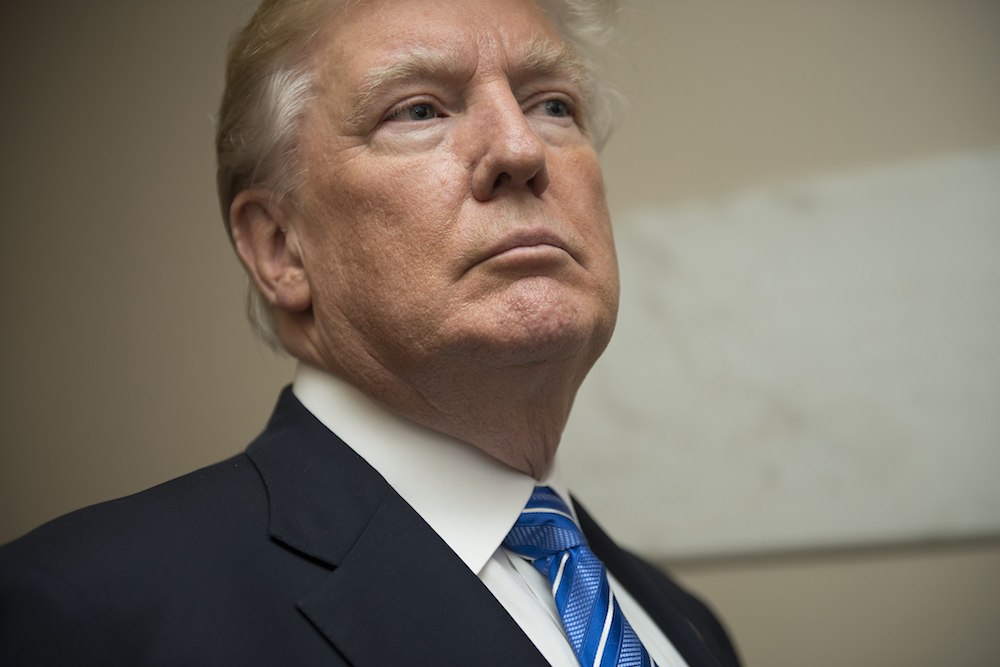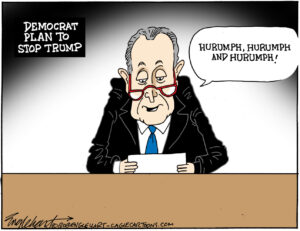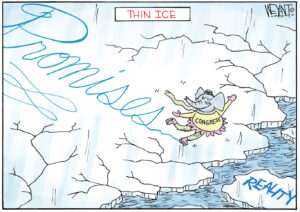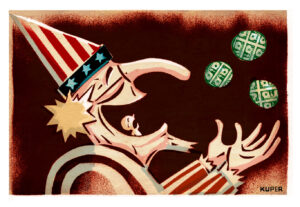Trump Says He Won’t Recertify Iran Nuclear Deal
The president says his administration will work with Congress to address the deal's "many flaws." Elizabeth Fraser / U.S. Army photo
Elizabeth Fraser / U.S. Army photo
WASHINGTON—The latest on the U.S.-Iran nuclear deal (all times local):
7 p.m.
A spokesman says United Nations Secretary-General Antonio Guterres “strongly hopes” the Iran nuclear deal will remain in place, after U.S. President Donald Trump accused Iran of violating the accord and said he might pull the U.S. out.
U.N. spokesman Stephane Dujarric notes that Guterres has long praised the 2015 pact as a very important breakthrough to stem the spread of nuclear weapons and advance global peace.
The U.N. agency monitoring the nuclear deal says Iran is honoring its commitments.
But Trump says Tehran has failed to honor the spirit of the deal and has committed “multiple violations” of the pact.
__
6:10 p.m.
Defense Secretary Jim Mattis says his first priority on Iran, now that President Donald Trump has announced his new approach, is to confer with allies.
Mattis told reporters at the Pentagon on Friday he wants to hear first-hand from allies in the Middle East and beyond, to understand better their views on what the Trump administration calls “misbehavior” in areas other than nuclear weapons. He was referring to Iranian support for extremist groups and its ballistic missile program, among others.
Mattis says the U.S. intends to “dissuade” Iran from shipping arms to Yemen, where it supports Shiite rebels known as Houthis. He says this does not imply any U.S. military action but rather a sharing of intelligence with allies and partners who share a concern about Iranian behavior.
__
5:30 p.m.
The chief of the U.N. agency monitoring the nuclear deal between Iran and six world powers says Iran is honoring its commitments.
The statement from Yukiya Amano of the International Atomic Energy Agency was issued Friday after U.S. President Donald Trump said he could not certify Iran’s compliance because the country has committed “multiple violations” of the deal.
Amano says the “nuclear-related commitments undertaken by Iran … are being implemented” and Tehran is “subject to the world’s most robust nuclear verification regime.”
Trump is not withdrawing from the deal or re-imposing nuclear sanctions. Instead, he tossed the issue to Congress and the other nations in the accord.
__
5:15 p.m.
Former Secretary of State John Kerry says President Donald Trump’s decision not to certify the Iran nuclear deal is reckless and divisive.
Kerry led the Obama administration’s Iran deal negotiations. In a statement Friday, Kerry says Trump is “creating an international crisis.”
Kerry says it is now up to Congress and the other parties to the deal to be “the adults in the room” and save it.
Trump’s decision stops short of pulling the United States out of the Iran deal and kicks the issue to Congress.
__
4:10 p.m.
Israel’s minister of intelligence says President Donald Trump’s decision not re-certify the Iran nuclear deal signals the administration’s resolve to counter the threat Iran poses.
Israel Katz says Trump’s move sets the stage for increasing pressure and for “fixing some of the flaws in the dangerous nuclear agreement which in its present form will allow Iran to develop a nuclear capability in the not so distant future.” Katz says the deal provides Iran with “a kind of an insurance policy until then.”
Israel has been a fierce critic of the 2015 deal, which lifted sanctions on Iran in exchange for concessions regarding its nuclear program. Israel has long warned that it failed to address Iran’s support for militant groups who act against it.
Iran openly calls for Israel’s destruction.
___
4 p.m.
French President Emmanuel Macron is countering U.S. President Donald Trump’s Iran announcement by holding talks with Iran’s president and pledging support for the international nuclear accord.
Macron’s office says he spoke Friday with Iranian President Hassan Rouhani, who gave assurances of Iran’s commitment to the 2015 accord. Macron didn’t address the risk of new U.S. sanctions.
Macron says he pressed Rouhani to help settle the Syrian crisis as part of efforts to improve trust.
Macron’s statement says Rouhani will host the International Atomic Energy Agency chief in Iran next week, and the French foreign minister will go to Iran soon to discuss the accord.
___
3:42 p.m.
Secretary of State Rex Tillerson says he fully expects that U.S. allies in Europe and the Middle East will be “very supportive” of President Donald Trump’s actions on Iran.
Tillerson is speaking after Trump accused Iran of violating the nuclear deal but stopped short of pulling out or re-imposing sanctions.
European countries that negotiated the 2015 deal with Iran and the U.S. had urged him not to do so and declared they were uninterested in renegotiating the deal.
But Tillerson says it’s “in all of our interest” to work together to confront the threat posed by Iran. He says that Trump’s plan is “quite clear.”
Tillerson spoke during a photo-op with the visiting head of the Organization of American States.
___
3:40 p.m.
The Senate’s top Democrat who opposed the Iran nuclear deal two years ago now says the accord is in the national security interests of the U.S.
Sen. Chuck Schumer of New York is urging President Donald Trump to keep the seven-nation pact in place.
Schumer says in a brief statement that Trump should listen to his top national security advisers who’ve recommended that the nuclear agreement be preserved.
Trump has threatened to pull the United States out of the deal unless Congress is able to fix the accord’s flaws and also toughen the law that governs U.S. participation in it.
___
3:20 p.m.
A senior Russian lawmaker says President Donald Trump’s decision not to recertify the Iran nuclear agreement raises the danger of conflict.
Frants Klintsevich is deputy chairman of the defense committee in the upper house of parliament. He tells the Interfax news agency, “The creation of an unstable situation can lead to Iran reacting. With its resources and capabilities, Iran is a very serious country.”
Separately, Deputy Foreign Minister Sergei Ryabkov is quoted by Interfax as saying there is a chance the two-year-old Iran nuclear deal “will avoid a complete and destructive attack from its opponents, and it should be tried.”
___
3:15 p.m.
Saudi Arabia is praising President Donald Trump’s tough words about the kingdom’s rival, Iran.
The Saudi government says in a statement carried by the state TV broadcaster that the kingdom welcomes Trump’s “commitment to work with U.S. allies in the region to face common challenges, particularly Iran’s aggressive policies.”
While Saudi Arabia says it supports the nuclear deal in place, it accuses Iran exploiting the economic benefits of sanctions being lifted “to continue destabilizing the region, especially through its ballistic missile development program and its support for terrorism in the region.”
The Sunni monarchy also names Iran’s backing of Shiite militias like Hezbollah in its statement of support for Trump’s tougher stance.
Saudi Arabia and Iran back warring factions in Syria and Yemen, and opposing groups in Lebanon, Bahrain and Iraq.
___
2:58 p.m.
Iranian President Hassan Rouhani says his country “will continue to stick to” the nuclear deal, calling it “much stronger” than U.S. President Donald Trump thinks.
Rouhani made the comments in a speech that aired Friday night on state television.
It came after Trump angrily accused Iran of violating the spirit of the 2015 accord and demanded Congress toughen the law governing U.S. participation. Trump said he is not ready to pull out of the deal but warned he would do so if it is not improved.
___
2:57 p.m.
Iran’s government says U.S. President Donald Trump’s claim that Iran has violated the spirit of the 2015 nuclear deal “has no international relevance or credibility.” Tehran said the deal can’t be renegotiated or altered.
A statement provided by Iran’s U.N. mission says Iran won’t be the first to walk away from the deal, but “if its rights and interests in the deal aren’t respected,” it will resume what it says is a peaceful nuclear program.
Trump’s speech accused Iran of a litany of malign behavior and announced new U.S. anti-terrorism sanctions against Iran’s main military wing, the Revolutionary Guard. Trump also called on U.S. allies to help impose sanctions that would target Iran’s ballistic missile program.
Iran says its missiles are purely defensive and that any U.S. action against the Revolutionary Guard will draw “a strong and unified reciprocal reaction.”
___
2:50 p.m.
Israeli Prime Minister Benjamin Netanyahu has congratulated U.S. President Trump for his decision not to re-certify to Congress the Iran nuclear deal.
In a statement released Friday, Netanyahu praised what he called a “courageous decision.” He says Trump has created an opportunity to “fix this bad deal” and to roll back Iran’s aggression. He encouraged all other relevant nations to do the same.
Netanyahu has been a fierce critic of the 2015 deal, which lifted sanctions on Iran in exchange for concessions regarding its nuclear program. He has long warned that it failed to address Iran’s support for militant groups who act against Israel.
Iran is Israel’s archenemy and openly calls for its destruction.
___
2:40 p.m.
The leaders of Britain, France and Germany say they “stand committed” to the Iran nuclear deal and are “concerned by the possible implications” of a U.S. decision to no longer back it in its current form.
British Prime Minister Theresa May, German Chancellor Angela Merkel and French President Emmanuel Macron issued a joint statement Friday night calling the deal “the culmination of 13 years of diplomacy” and “a major step towards ensuring that Iran’s nuclear program is not diverted for military purposes.”
The three leaders are urging the Trump administration and Congress to consider the possible consequences for the West’s security “before taking any steps that might undermine” the deal, including imposing sanctions on Iran that the agreement lifted.
U.S. President Donald Trump announced Friday that he will not re-certify the deal to Congress, and said if Congress can’t come up with new legislation, he will terminate the Obama-era pact.
___
2:30 p.m.
The top Democrat in the House is calling President Donald Trump’s refusal to certify that Iran is complying with the nuclear agreement “a grave mistake.”
Rep. Nancy Pelosi of California says Trump’s decision threatens U.S. security and credibility.
She says Trump ignored “the overwhelming consensus of nuclear scientists, national security experts, generals and his own Cabinet, including, reportedly, his secretary of defense and secretary of state.”
Defense Secretary Jim Mattis told a Senate committee last week that it’s in the national security interests of the United States to stay a part of the international accord.
She says America’s allies in Europe have no intention of leaving the seven-nation pact.
Pelosi says if Trump’s judgment leads to an unraveling of the deal, it’ll be the United States that’s isolated, not Iran.
___
2:15 p.m.
President Donald Trump says that if Congress doesn’t come up with satisfactory changes to the Iran nuclear deal in a “very short” period of time then he’s prepared to “terminate” it.
Trump tells reporters following a White House speech that he’s “very unhappy with Iran.” He says the country “has to behave much differently.”
Trump is not withdrawing from the deal but instead has asked Congress to come up with a fix. It’s an approach that he defended.
Trump says, “I like the two step process much better.”
Still, he says, he may choose to pull out at a later date: “We’ll see what happens over the next short period of time.”
He also says world leaders, including from France and Britain, urged him not to scrap it.
___
1:55 p.m.
European Union foreign policy chief Federica Mogherini (feh-deh-REE’-kah moh-gehr-EE’-nee) says the Iran nuclear deal is a robust agreement that is working and cannot be terminated by any leader, including U.S. President Donald Trump.
Mogherini said Friday that the accord “is a robust deal that provides guarantees and a strong monitoring mechanism so that Iran’s nuclear program is, and will remain, exclusively for civilian purposes only.”
Mogherini, who worked on behalf of major world powers to secure the deal, told reporters that “there have been no violations of any of the commitments.”
She underlined that Trump cannot kill the deal, saying: “the President of the United States has many powers. Not this one.”
She added that the EU remains committed to the Iran nuclear pact.
___
1:40 p.m.
House Speaker Paul Ryan says the Iran nuclear deal forged during the Obama administration is “fatally flawed” and he backs President Donald Trump’s decision to re-examine the seven-nation accord.
The Wisconsin Republican says weaknesses in the nuclear agreement will allow Iran “to pursue nuclear weapons under the guise of international legitimacy” once specific restrictions on Iran’s nuclear program expire after predetermined periods of time.
Ryan says simply enforcing a bad agreement is not sufficient.
Trump has declared he will not re-certify the Iran nuclear deal. He says Tehran has failed to honor the spirit of the deal and has committed “multiple violations” of the pact.
Ryan says the GOP-led House will work with the Trump administration “to counter Iran’s range of destabilizing activities.”
___
1:22 p.m.
President Donald Trump says he will not re-certify the Iran nuclear deal because the country is not living up to the spirit of the deal and has committed “multiple violations.”
Trump says during a White House speech Friday that he “cannot and will not make this certification.”
Trump says he is directing his administration to work closely with Congress to address the deal’s “many flaws” and to make sure the country can never threaten the U.S. with nuclear weapons.
He says that if Congress can’t come up with new legislation, he will terminate the Obama-era pact.
Any decision to re-impose nuclear-related sanctions would automatically kill America’s participation in the deal.
Trump’s move is essentially a compromise that allows him to condemn the accord but stop short of torpedoing it.
___
1:18 p.m.
The Trump administration is hitting Iran’s elite Revolutionary Guard with sanctions for supporting terrorism.
The new designation uses existing sanctions authority created by an executive order in 2001. The Treasury Department says the penalties are punishment for supporting the Quds force, an expeditionary unit of the Revolutionary Guard. The Treasury Department also says the Revolutionary Guard has supported lethal activities by Hezbollah and Hamas, and enabled Syrian President Bashar Assad’s “relentless campaign of brutal violence against his own people.”
But the U.S. is not adding the Revolutionary Guard to the formal U.S. list of foreign terrorist organizations. That step would force the U.S. to take even further steps against the Revolutionary Guard that Secretary of State Rex Tillerson says could be problematic.
___
1:15 p.m.
President Donald Trump says Iran is not living up to the “spirit” of the nuclear deal that it signed in 2015. He’s announcing a new strategy in a speech at the White House.
Trump says the administration will seek to counter the regime’s destabilizing activities and will impose additional sanctions on the regime to block its financing of terrorism.
The president says the new strategy will also seek to address the proliferation of Iran’s missiles and weapons.
And he says the U.S. will deny Iran’s paths to develop nuclear weapons.
___
1:10 p.m.
President Donald Trump is criticizing the Iran nuclear deal as he discusses his administration’s approach going forward.
Trump says in a White House speech that the deal was “one of the worst” and most “one-sided transactions the United States has ever entered into.”
Trump is arguing the sanctions lifted by the deal gave the country’s leaders a “lifeline” when they were in financial trouble.
And he says the deal delivered weak inspections in exchange for no more than a temporary delay in Iran’s path to nuclear weapons.
Trump is giving a speech unveiling his administration’s new strategy for dealing with the country.
___
1 p.m.
The chairman of the Senate Foreign Relations Committee says he’ll be introducing legislation in the next two weeks that will address the international agreement that rolled back Iran’s nuclear program.
Sen. Bob Corker says the bill won’t violate the U.S. commitment to the nuclear deal. He says the measure requires the president to certify to Congress twice a year instead of every 90 days that Iran is complying with the pact. President Donald Trump has bristled over the frequency of the certifications.
The Tennessee Republican says the legislation would reinstitute U.S. sanctions against Iran if Tehran gets within one year of having nuclear weapons. The measure also expands the “verification powers” of the International Atomic Energy Agency.
He says he’s working with Republican Sen. Tom Cotton on the legislation.
___
11:35 a.m.
Secretary of State Rex Tillerson says President Donald Trump will not withdraw from the Iran nuclear deal or reimpose sanctions, but he will say the pact is not in U.S. national security interests.
Trump is scheduled to give a speech Friday afternoon on the nuclear accord, which he has repeatedly denounced as the worst deal in American history. The plan would allow Trump to keep up his criticism of the deal, while also reassuring U.S. allies that Washington will not walk away from it — at least not immediately.
Tillerson said Friday that Trump would urge Congress to toughen requirements for Iran to continue to get relief from U.S. sanctions. The administration wants Congress also to amend legislation to highlight troubling non-nuclear Iranian behavior not covered by the deal.
___
8:40 a.m.
A European diplomat close to the Iran nuclear deal says EU foreign ministers are expected to call for the accord’s continued implementation.
The diplomat spoke shortly before U.S. President Donald Trump was expected to urge U.S. lawmakers to codify tough new requirements for Tehran.
The senior EU diplomat noted Friday that the Trump administration has already certified it twice, and that the International Energy Agency has done so eight times.
Should Trump decertify the deal, the diplomat said the EU’s message to Iran “is very clear: you have to stick to the agreement.”
The diplomat spoke on condition of anonymity because the person was not authorized to speak publicly.
The diplomat said the EU believes the nuclear deal is “a very good agreement because it has a very stringent, long-term verification and monitoring mechanism.”
___
8:30 a.m.
The French government reaffirms its “attachment” to the nuclear deal with Iran and insists on the importance of multilateralism to solve international issues.
French foreign affairs’ spokeswoman Agnes Romatet-Espagne said in a statement the deal is a “solid, robust and verifiable tool guaranteeing that Iran will not get the nuclear weapons”
Romatet-Espagne said “multilateralism is the only way to create a lasting peace.”
Trump is not expected to announce that the U.S. is withdrawing from the deal, but he will urge U.S. lawmakers to codify tough new requirements for Tehran to continue to benefit from the sanctions relief.
___
7:50 a.m.
The Kremlin is warning that a U.S. move to slight the Iran nuclear deal would hurt global security.
Dmitry Peskov, a spokesman for Russian President Vladimir Putin, said that spiking the deal “would undoubtedly hurt the atmosphere of predictability, security, stability and non-proliferation in the entire world.”
Peskov spoke hours before U.S. President Donald Trump was expected to deliver a speech harshly criticizing the 2015 nuclear accord. Trump is not expected to announce that the U.S. is withdrawing from the deal, but he will urge U.S. lawmakers to codify tough new requirements for Tehran to continue to benefit from the sanctions relief.
The initial agreement involved the U.S., Britain, France, Germany, Russia and China.
Peskov said that the U.S. move against the nuclear deal would have “very negative consequences” and “seriously exacerbate the situation around the Iranian nuclear dossier.” He added that Iran has warned that it would respond by opting out of the deal.
___
7:45 a.m.
The German government says the nuclear deal with Iran is an “important instrument” to prevent the country from acquiring atomic weapons and that Berlin will continue to support full implementation.
Government spokesman Steffen Seibert told reporters in Berlin on Friday that “we consider this deal to be an important instrument to prevent Iran’s nuclear armament. That’s why we will continue to work for its full implementation.”
German Foreign Minister Sigmar Gabriel has reached out to U.S. Secretary of State Rex Tillerson repeatedly in recent weeks, including late Thursday, to discuss the Iran deal.
A spokeswoman for Gabriel said German, French and British diplomats have also been meeting with U.S. lawmakers from both parties in Washington to press the European view of the deal’s importance.
___
7:20 a.m.
The Iranian parliament speaker says any U.S. move against a nuclear deal with Iran be an insult to the United Nations.
Ali Larijani (lehr-uh-ZHAH’-nee) spoke on a visit to Russia hours before President Donald Trump was expected to deliver a speech harshly criticizing the 2015 accord.
The agreement offered Iran relief from crippling economic sanctions in exchange for strict limits on its nuclear program. It was painstakingly negotiated by then-President Barack Obama’s administration and also involved a coalition of world powers including the Britain, France, Germany, Russia and China.
Larijani said the accord has received a U.N. blessing, so any move to spike it would be “an insult to the U.N.” He added that any revision of the deal would allow Iran to take its own action.
___
5 a.m.
President Donald Trump will say Friday the Iran nuclear deal is no longer in U.S. national security interests, but he won’t withdraw from the landmark deal.
The Iran deal was negotiated over 18 months by the Obama administration. Under U.S. law, Trump faces a Sunday deadline to notify Congress whether Iran is complying with the accord.
In a speech from the White House, Trump is expected to outline faults he finds in the pact and will also focus on an array of Iran’s troubling non-nuclear activities. Those include Tehran’s ballistic missile program and support for Syrian President Bashar Assad, as well as Lebanon’s Hezbollah movement.
Trump is expected to say these actions violate the spirit of the regional stability.
Your support is crucial…With an uncertain future and a new administration casting doubt on press freedoms, the danger is clear: The truth is at risk.
Now is the time to give. Your tax-deductible support allows us to dig deeper, delivering fearless investigative reporting and analysis that exposes what’s really happening — without compromise.
Stand with our courageous journalists. Donate today to protect a free press, uphold democracy and unearth untold stories.






You need to be a supporter to comment.
There are currently no responses to this article.
Be the first to respond.